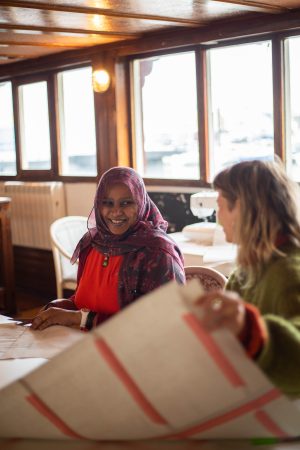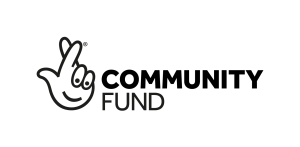June was summer sewing month and a great opportunity to celebrate ONCA’s Dresscue project and the amazing people involved.
Running every Friday morning between 10am and 1pm on ONCA Barge at Brighton Marina, Dresscue provides a free space, sewing machines, material and support for anyone curious about mending and making with textiles. Over the past year, with the help of PFAFF UK who have sponsored us with sewing machines, Dresscue has blossomed into a welcoming community in which we are able to learn from one another and explore our own ability to mend and make.

WHY DO WE CHAMPION SLOW FASHION ?
The message is only getting louder and harder to ignore: fast fashion is destructive to our planet. With clothing consumption having risen by 400% in the last 20 years, and the equivalent of 1 rubbish truck full of textiles burned or sent to landfill every second, it’s no wonder that the earth is paying the price. Although the main responsibility for this lies with corporations and economic systems valuing profit over people and planet, we believe that it’s crucial to do what we can, when we can, in order to give agency to ourselves, and begin to effect change from home. Alongside this, fast fashion often doesn’t cater to our varied, everyday, unique bodies. To make, alter, fix and commit time and energy to our clothes is an act of rebellion, and to share these skills with each other is one of community.

MEET SALLY
Sally Bourner is the founder of Dresscue. With a background in costume making, Sally is a maker and community artist working with purposeful attention to slow craft and sustainable forms of making. We spoke to her about how she got here and the significance of Dresscue to her:
I’m the community artist at ONCA. I work predominantly on the Barge where I facilitate Dresscue, our drop-in community sewing space where people can make, mend and upcycle. The space is open to all skills and abilities. If someone is new to sewing we can support them to build confidence on a sewing machine, although most of the time people come with a very clear idea of what they want to make and I’ll just be around for technical support. Everyone on board is at different stages of sewing experience so we all support each other and share knowledge.
Originally I trained as a costume maker and worked for a television series in New Zealand, but for the last 6 years I’ve worked in community art settings. I completed an MA in Inclusive Arts Practice a few years ago and currently I work on projects that support better mental health and wellbeing through engaging in creativity. About 3 years ago, I stopped buying from high street shops completely and have been making all my own clothes since – apart from the odd clothes swap and underwear purchase!
Dresscue is a community space with a real sense of shared ownership over what we do and how we do it. It’s a welcoming and supportive space to learn new skills and share knowledge through informal learning. Through making together, people connect gently and friendships grow. I really view making clothes for yourself as an act of self love: you can make clothes that are more interesting, more beautiful and more functional than fast fashion offers – you can add pockets to everything! Clothes that we make for ourselves can empower and celebrate all bodies rather than the narrow offer from many shops. And through understanding the time and labour it takes to create something, people value clothes more and we see people mobilise against fast fashion through sustainable practices, collaboration and dialogue. We know that engaging in creativity supports better wellbeing and community cohesion. I really see that happen in Dresscue.
Thank you to PFAFF UK for donating our sewing machines and National Lottery Community Fund for supporting our work.
Photos by Phoebe Wingrove
—
Share on Twitter /
Share on Facebook
Posted on June 27, 2022
Categories: #MyONCAStory, Education for Sustainability, Interviews, Opportunities
Tags: 2022, Barge, dresscue, PFAFF, Sally Bourner

